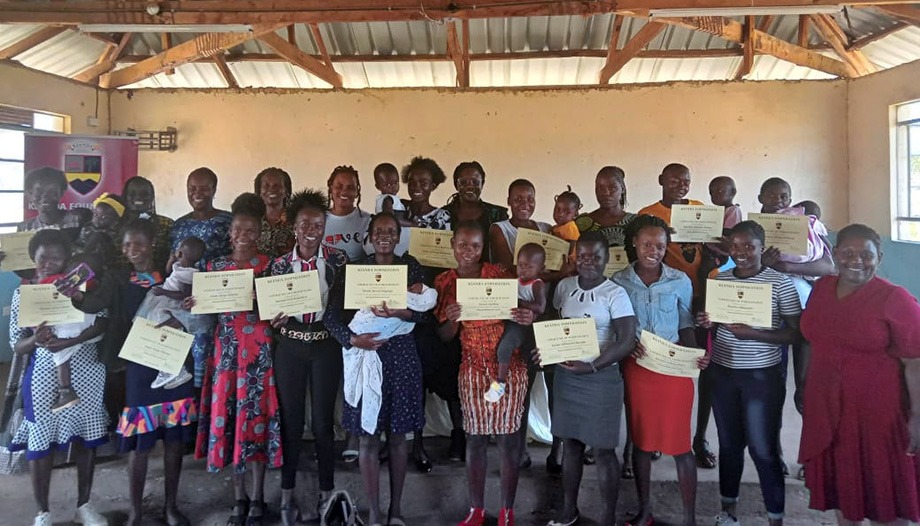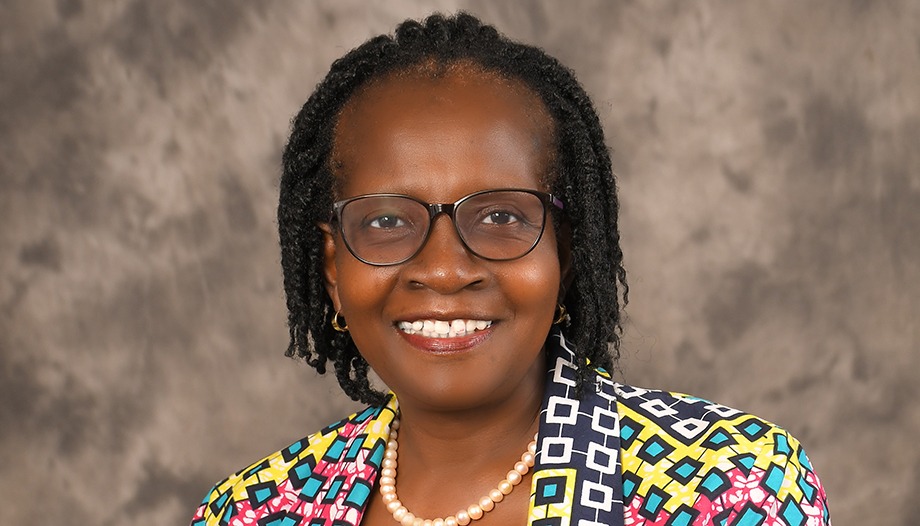Florence Jacqueline Achieng 'Oloo is the winner of the Harambee Award 2023 to the Promotion and Equality of African Women. Oloo holds a Bachelor of Science degree in Chemistry from the University of Nairobi, a Bachelor of Arts degree in Philosophy and Educational Sciences from the University of Rome and a PhD in Chemistry from the Jomo Kenyatta University of Agriculture and Technology, Kenya.
This professor of chemical sciences at the University of Technical University of Kenyais a founding member of the Ethics Committee of Strathmore in which it directs the review and oversight of research of any nature involving human subjects to ensure that proposed protocols comply with appropriate ethical guidelines before participants may enroll.
In addition to this, Dr. Oloo has promoted the Women Empowerment Program, Jakana - Kenyawegi for girls and women from diverse and vulnerable backgrounds in Kisumu County. An area bordering neighboring Uganda where more than half a million women live, many of whom live in poverty.
Dr. Oloo highlights for Omnes the greater potential of women in these communities and the need to harmonize African traditions and values with the necessary advancement of the rights of women and girls, especially in rural areas.
What are the main lines of the project for which the Harambee 2023 Award will be used?
- The award will be used for the education of women in rural areas, particularly in Kisumu County. Self-leadership skills will be taught there: to improve their self-awareness, self-esteem, sense of initiative and ability to express their opinions.
They are also taught entrepreneurial techniques to provide them with skills that will enable them to start and maintain an economic activity that will provide them with income. Along with these, pastry and bakery courses are conducted to ensure that they have a skill set that they can monetize.
These courses are accompanied by a follow-up or mentoring of the women to reinforce and ensure the implementation of the aforementioned results, and the women are also shown various entrepreneurial opportunities that contribute to ensuring food security and reducing poverty levels.
Harambee has been highlighting the role of African women for more than 20 years. Is there still a long way to go in the field of women's rights and equal opportunities for women in Africa?
- There has been tremendous progress especially in educating the girl child and building their capacity to enable them sit in the same employment or activity spaces as men. However there is still a lot to be done especially for women in rural areas.
Women in urban areas are more exposed to education and opportunities to grow them. This is not the case for many women in rural areas hence some are trapped in situations that forever limit their capabilities of being the best version of themselves e.g. early marriages, polygamous marriages, male chauvinism or strong patriarchal beliefs or systems that silence women.
However the leading cause of the aforementioned issues is poverty which leads to lack of education.
There are examples of "female empowerment" that attack values that consider traditional and even oppressive, such as family, motherhood or the care of the weakest, how can we balance the values of African women in these areas and the necessary progress in their rights?
In as much as we empower women to seek employment or business opportunities like men, education on the traditional values are equally important.
Women are key in holding a family together. Families are essential for the development and sustenance of society as a whole.
Only when we have individuals who are well raised in families can we have a society that has sober, innovative, hardworking, persistent and resilient people who are eager to create a better world and a better environment. The key to these results is women.
Only when we have individuals well raised in families can we have a society that has sober, innovative, hardworking, persistent and resilient people keen on creating a better world and environment. The key to such outcomes is the woman. Women who look after their families bring out the best in their spouses and their children. Women have this capacity more than the men hence the need to ensure that in as much as they are empowered from an educational and career perspective, their traditional roles are not completely thrown out of the window.
The African woman needs to be educated on how to balance her work and her traditional roles. Men on the other hand need to be educated on how to support their spouses so that women are not overwhelmed trying to balance work and family.

Once a woman is educated, her family and society are educated. You speak of a holistic view of women, how does this view manifest itself despite the difficulties?
- Women have the capacity to see issues holistically more than men. They can multitask effectively looking after themselves, their roles in the home and work environment. They also have a capacity to foresee the impact of their activities on all those around them. With this in mind, if she is empowered she is capable of harnessing her strength as well as that of her family and other people in her environment.
This can only be well illustrated using an example. Lucy is a woman leaving in a rural area. She is 29 years old, married and has 3 children. She was recently diagnosed with diabetes and was hospitalized. She came out of hospital, however her health had deteriorated and she was miserable, literally not knowing what to do with her life. Her husband in the past had tried setting up businesses for her but all of them collapsed as she did not have the knowhow or will to work on it. So her husband told her to focus on being a stay at home mum. In her state, she did not do well either as a stay at home mum as there was a lot of disorder and she also squandered the money her husband gave her on a daily basis. This brought conflict between her and her husband. And her health also deteriorated because of stress.
Lucy later participated in a seven-month training program for women, focusing on business skills, cooking skills, self-leadership skills, counseling and mentoring sessions. This was an eye-opener for her. The first skill she learned and put into practice was managing her finances and she started saving money from what her husband gave her and from the small income she earned from selling eggs from her farm. With the money she saved in two months she bought a glucometer to better control her diabetes. She began keeping records of egg sales and taking better care of her poultry. At home she cooked better and prepared healthier meals. Her house was neater and cleaner. These aspects greatly impressed her husband and children. In fact, the husband says he is looking forward to returning home to be with his family. The home is calmer and they enjoy time together.
Moving forward, Lucy was exposed to a 7 months training program for women which focused on entrepreneurship skills, cookery skills, self-leadership skills, counselling sessions and mentoring. This was an eye opener for her. The first skill she learnt and put into practice was managing her finances and she began saving money from what her husband gave her as well as small income she got from selling eggs from her farm. With the money she saved in 2 months, she bought a glucometer to manage her diabetes better. She began keeping records for the sales from the eggs and she also started looking after her poultry better. At home she cooked better and produced healthier meals. Her home was neater and cleaner. These aspects really impressed her husband and children. In fact the husband says he looks forward to going home to be with his family. The home is more peaceful and they enjoy time together. The husband was so happy with Lucy that he decided to open a restaurant business for her. This is because of her capacity to cook well and the fact that she now knows how to handle money. Her restaurant is near his butchery and so he supplies the meat. As we speak she has employed 2 people to help her out and she makes a profit on a daily basis. As you can see in this situation, the family is sorted out from an economic and social perspective. And other individuals outside the family are also sorted out economically.
Are we still looking at Africa with "white eyes" and trying to impose thoughts, attitudes..., far removed from the African spirit?
-Yes this is still prevalent.
Only Africans can produce effective solutions for problems encountered by Africans.
Our traditions have a key role to play in our way of being and how we handle issues. We cannot throw that away. Instead, we need to see the positive aspects of our traditions that can be incorporated in the empowerment process of the African people. This is a more sustainable way of dealing with our issues. E.g. we thrive more doing things in groups or as a community as opposed to the western way which promotes individualism.
Community is key in the African way of being, hence development projects have to be designed and implemented taking this factor into consideration.
Thank you speech
During his acceptance speech for the Harambee award, Oloo said that his passion at work "has been to train scientists so that science is conducted ethically". So that "data are not falsified, the rights and privacy of participants are respected, and the results of scientific research are genuine."
Her other great passion "is working for women living in rural Kenya. This is especially important because women face many challenges. As Florence explained, "dropping out of school leads to idleness among girls. This situation exposes them to sexual relations, which leads to teenage pregnancies. In addition, girls are easily lured by wealthy men or motorcycle providers to engage in sex in exchange for money, which the girls use to meet their basic needs."
The award winner emphasized that her concern, since she began her scientific career, "has been to promote social and technical research that would lead to excellence and promote the development of my country". She ended her speech by saying: "I am very proud to be African, I am very proud to be an African woman and to have the opportunity to help my country through my work".








